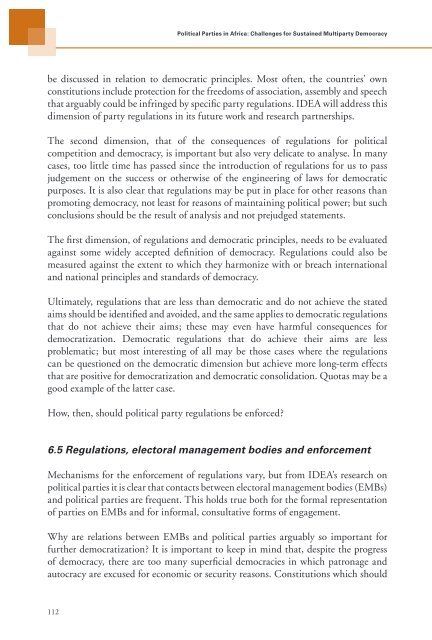Political Parties in Africa: Challenges for Sustained Multiparty
Political Parties in Africa: Challenges for Sustained Multiparty
Political Parties in Africa: Challenges for Sustained Multiparty
You also want an ePaper? Increase the reach of your titles
YUMPU automatically turns print PDFs into web optimized ePapers that Google loves.
<strong>Political</strong> <strong>Parties</strong> <strong>in</strong> <strong>Africa</strong>: <strong>Challenges</strong> <strong>for</strong> Susta<strong>in</strong>ed <strong>Multiparty</strong> Democracy<br />
be discussed <strong>in</strong> relation to democratic pr<strong>in</strong>ciples. Most often, the countries’ own<br />
constitutions <strong>in</strong>clude protection <strong>for</strong> the freedoms of association, assembly and speech<br />
that arguably could be <strong>in</strong>fr<strong>in</strong>ged by specific party regulations. IDEA will address this<br />
dimension of party regulations <strong>in</strong> its future work and research partnerships.<br />
The second dimension, that of the consequences of regulations <strong>for</strong> political<br />
competition and democracy, is important but also very delicate to analyse. In many<br />
cases, too little time has passed s<strong>in</strong>ce the <strong>in</strong>troduction of regulations <strong>for</strong> us to pass<br />
judgement on the success or otherwise of the eng<strong>in</strong>eer<strong>in</strong>g of laws <strong>for</strong> democratic<br />
purposes. It is also clear that regulations may be put <strong>in</strong> place <strong>for</strong> other reasons than<br />
promot<strong>in</strong>g democracy, not least <strong>for</strong> reasons of ma<strong>in</strong>ta<strong>in</strong><strong>in</strong>g political power; but such<br />
conclusions should be the result of analysis and not prejudged statements.<br />
The first dimension, of regulations and democratic pr<strong>in</strong>ciples, needs to be evaluated<br />
aga<strong>in</strong>st some widely accepted def<strong>in</strong>ition of democracy. Regulations could also be<br />
measured aga<strong>in</strong>st the extent to which they harmonize with or breach <strong>in</strong>ternational<br />
and national pr<strong>in</strong>ciples and standards of democracy.<br />
Ultimately, regulations that are less than democratic and do not achieve the stated<br />
aims should be identified and avoided, and the same applies to democratic regulations<br />
that do not achieve their aims; these may even have harmful consequences <strong>for</strong><br />
democratization. Democratic regulations that do achieve their aims are less<br />
problematic; but most <strong>in</strong>terest<strong>in</strong>g of all may be those cases where the regulations<br />
can be questioned on the democratic dimension but achieve more long-term effects<br />
that are positive <strong>for</strong> democratization and democratic consolidation. Quotas may be a<br />
good example of the latter case.<br />
How, then, should political party regulations be en<strong>for</strong>ced?<br />
6.5 Regulations, electoral management bodies and en<strong>for</strong>cement<br />
Mechanisms <strong>for</strong> the en<strong>for</strong>cement of regulations vary, but from IDEA’s research on<br />
political parties it is clear that contacts between electoral management bodies (EMBs)<br />
and political parties are frequent. This holds true both <strong>for</strong> the <strong>for</strong>mal representation<br />
of parties on EMBs and <strong>for</strong> <strong>in</strong><strong>for</strong>mal, consultative <strong>for</strong>ms of engagement.<br />
Why are relations between EMBs and political parties arguably so important <strong>for</strong><br />
further democratization? It is important to keep <strong>in</strong> m<strong>in</strong>d that, despite the progress<br />
of democracy, there are too many superficial democracies <strong>in</strong> which patronage and<br />
autocracy are excused <strong>for</strong> economic or security reasons. Constitutions which should
















